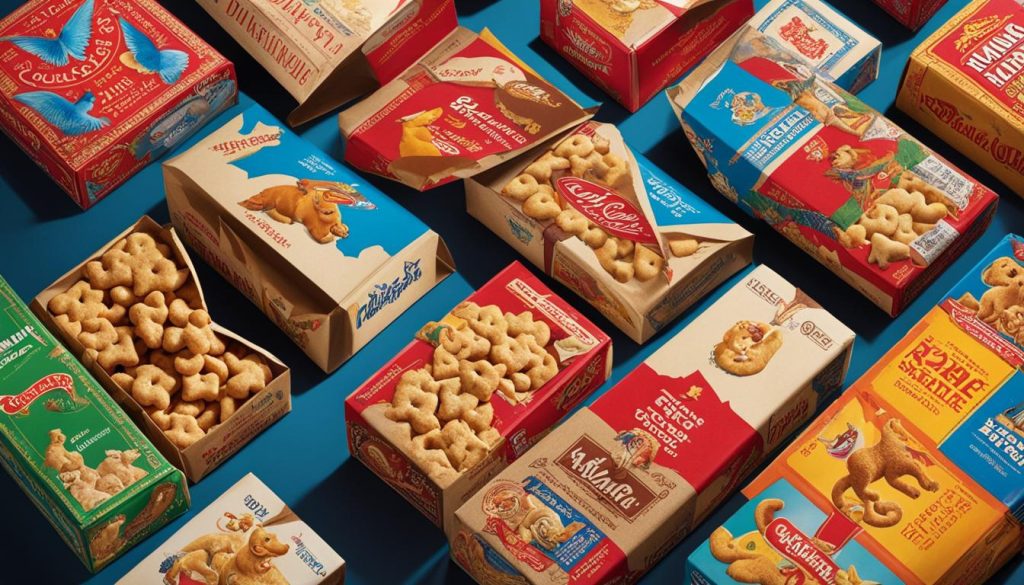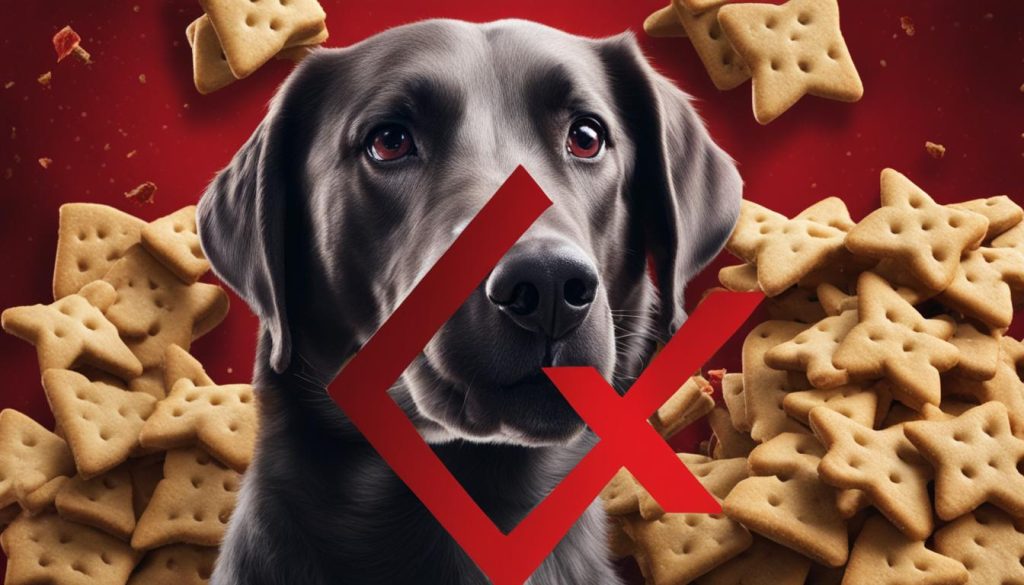As a professional in the field of canine nutrition, I often encounter questions about what dogs can and cannot eat. One popular snack that pet owners often wonder about is animal crackers. While they may seem harmless and even tempting to share with your furry friend, it’s important to consider their suitability for a canine diet and the potential health risks they may pose.
Animal crackers are bite-sized cookies shaped like various animals. They have been a beloved snack for both children and adults for decades, evoking feelings of nostalgia and fun. However, when it comes to feeding animal crackers to dogs, there are several factors that need to be taken into account.
In this article, I will provide professional insights into the question of whether dogs can have animal crackers. We will explore the nutritional content of these treats, the potential health risks they may pose to dogs, and the expert-recommended alternatives to ensure your furry companion receives safe and healthy treats.
Key Takeaways:
- Animal crackers may not be suitable for dogs due to their nutritional content and potential health risks.
- Excessive sugar consumption in animal crackers can lead to weight gain and dental issues in dogs.
- Artificial additives found in animal crackers may trigger allergic reactions in some dogs.
- The shape and texture of animal crackers can pose a choking hazard, especially for smaller breeds or dogs prone to gulping their food.
- Consult with a veterinarian to determine whether it is safe to give your dog animal crackers and to explore alternative treats specifically recommended for dogs.
Understanding the Basics: What are Animal Crackers?

Animal crackers are delightful bite-sized cookies that have been enjoyed by people of all ages for decades. These adorable snacks are shaped like various animals, adding a touch of whimsy to the snacking experience. But have you ever wondered about the history and composition of these beloved treats?
The origin of animal crackers can be traced back to the late 19th century when Stauffer’s Biscuit Company first introduced them. Over the years, animal crackers have undergone various transformations in terms of flavors, shapes, and packaging. However, they continue to evoke a sense of nostalgia and fun, making them a favorite snack for many.
To understand whether animal crackers are suitable for our furry friends, it’s important to delve into their composition. Typically, animal crackers are made from a combination of flour, sugar, vegetable oil, baking soda or powder, flavorings, and salt. These ingredients are what give animal crackers their distinct taste and texture.
Now that we’ve explored what animal crackers are and a brief history of their existence, let’s delve deeper into their nutritional content and potential health risks for dogs.
Nutritional Content of Animal Crackers
When considering whether it is safe for dogs to eat animal crackers, it’s important to examine their nutritional content and key ingredients. Animal crackers are typically made from a combination of flour, sugar, vegetable oil, baking soda or powder, flavorings, and salt. While these ingredients may be safe for humans in moderation, they can pose potential health hazards for dogs.
Excessive sugar consumption can lead to weight gain, dental issues, and an increased risk of conditions like diabetes and obesity in dogs. Additionally, artificial additives present in animal crackers may trigger allergic reactions in some dogs. It’s crucial to be aware of these factors and consider the nutritional content of animal crackers before including them in your dog’s diet.
To provide a clearer understanding of the nutritional composition of animal crackers, the following table breaks down the key ingredients and their approximate quantities:
| Key Ingredients | Approximate Quantity |
|---|---|
| Flour | 50% |
| Sugar | 25% |
| Vegetable Oil | 10% |
| Baking Soda or Powder | 5% |
| Flavorings | 5% |
| Salt | 5% |
While this breakdown provides valuable insights into the composition of animal crackers, it’s essential to remember that these quantities may vary depending on the specific brand and recipe. Always refer to the product packaging or contact the manufacturer for accurate nutritional information.
Health Risks of Feeding Animal Crackers to Dogs

Feeding animal crackers to dogs can pose several health risks that pet owners should be aware of. Overconsumption of these cookies can lead to weight gain and digestive issues in dogs. The high sugar content in animal crackers can also be problematic, potentially contributing to dental problems and increasing the risk of conditions like diabetes and obesity.
Allergic reactions are another concern when it comes to feeding animal crackers to dogs. Some dogs may have sensitivities or allergies to certain ingredients found in these snacks, such as wheat or artificial additives. It’s important to monitor your dog for any signs of an allergic reaction, including itching, redness, swelling, or gastrointestinal disturbances, and consult with a veterinarian if any concerns arise.
The shape and texture of animal crackers can also present a risk of choking, especially for smaller dog breeds or dogs that tend to gulp their food without chewing properly. It’s crucial to supervise your dog while they are eating animal crackers to prevent any choking incidents. If your dog has a habit of eating quickly or has a history of choking, it may be best to avoid giving them animal crackers altogether and opt for safer treat options.
Considering the potential long-term health risks and immediate hazards associated with feeding animal crackers to dogs, it is advisable to explore alternative treats that are specifically formulated for canine consumption. There are many healthy and dog-friendly treat options available in the market that provide a safer and more nutritionally balanced alternative to animal crackers. Consulting with a veterinarian can help you determine the best treat options for your dog’s specific dietary needs and preferences.
Veterinarian’s Take on Dogs Eating Animal Crackers

When it comes to feeding animal crackers to dogs, veterinarians generally advise caution. While small quantities on occasion may not cause harm, it’s important to consider your dog’s individual dietary needs and health conditions before introducing them to this snack. As a professional in the field, I recommend consulting with your veterinarian to determine when it may be safe to give your dog animal crackers.
When discussing the potential risks and benefits of feeding animal crackers to dogs, veterinarians can provide valuable insights and guidance. They can assess your dog’s overall health, dietary requirements, and any existing medical conditions that may be affected by consuming animal crackers. Veterinarians can also recommend alternative treats that are specifically formulated for dogs, ensuring their nutritional needs are met while minimizing potential health risks.
It’s important to keep in mind that every dog is unique, and what may be safe for one dog may not be suitable for another. While some dogs may tolerate the occasional animal cracker without issues, others may experience adverse reactions. Always prioritize your dog’s well-being and consult with your veterinarian to make the best decisions regarding their diet and treat options.
Alternative Treats Recommended by Veterinarians
When it comes to finding safe and dog-friendly alternatives to animal crackers, veterinarians can offer expert recommendations. They can suggest treats that are specifically formulated for dogs, taking into account their nutritional needs, taste preferences, and any dietary restrictions or allergies they may have. Some veterinarian-recommended alternatives to animal crackers include:
- Vet-approved dog biscuits or cookies
- Natural, single-ingredient treats such as freeze-dried meats or fruits
- Dental chews designed to promote oral health
- Homemade treats made with dog-safe ingredients
By choosing alternative treats that are veterinarian-recommended, you can provide your dog with a safe and enjoyable snacking experience. Remember to always introduce new treats gradually and monitor your dog for any adverse reactions. Any concerning symptoms, such as vomiting, diarrhea, or changes in behavior, should be discussed with your veterinarian.
Fig Newtons: A Similar Snack

When considering whether dogs can eat fig Newtons, it’s important to assess the potential risks associated with this popular treat. Fig Newtons are cookies enjoyed by humans and may seem tempting to share with our furry friends. However, it’s crucial to be aware of their high sugar content and artificial ingredients, which can be harmful to dogs. Additionally, the fig filling in these cookies may contain added sugar and preservatives that are not ideal for canine consumption.
Feeding fig Newtons to dogs can have adverse effects on their health. The high sugar content in these cookies can contribute to weight gain, dental issues, and even conditions like diabetes and obesity. Artificial ingredients, commonly found in processed snacks like fig Newtons, may also trigger allergic reactions in some dogs. Therefore, it is best to avoid feeding fig Newtons to your canine companion and opt for safer alternatives specifically formulated for dogs.
The Hazards of Fig Newtons for Dogs
Feeding fig Newtons to dogs can present several risks due to their ingredients and composition. Here are some potential hazards:
- High sugar content: Fig Newtons contain a significant amount of sugar, which can lead to weight gain and dental issues.
- Artificial ingredients: Processed snacks often contain artificial flavorings, colors, and preservatives that can be harmful to dogs.
- Fig filling: The fig filling in Newtons may contain added sugar and preservatives, which may not be ideal for canine consumption.
Considering these risks, it’s advisable to refrain from giving fig Newtons to dogs and instead opt for healthier, dog-friendly treats that are specifically formulated to meet their dietary needs.
Dog-Friendly Alternatives
Instead of fig Newtons, there are numerous dog-friendly alternatives available that can satisfy your dog’s cravings without the associated risks. Here are some options:
- Homemade treats: You can make delicious and nutritious treats for dogs using natural ingredients like fruits and vegetables.
- Commercial dog treats: Choose high-quality treats designed specifically for dogs that are free from harmful ingredients.
- Fresh fruits: Fruits like apples, bananas, and berries can be a healthy and enjoyable occasional treat for dogs.
- Vet-approved treats: Consult with your veterinarian to identify vet-approved treats that are suitable for your dog’s dietary needs and preferences.
By opting for these alternatives, you can ensure that your furry friend enjoys tasty treats while also promoting their overall health and well-being.
| Risks of Feeding Fig Newtons to Dogs | Dog-Friendly Alternatives |
|---|---|
|
|
Alternatives to Animal Crackers and Fig Newtons for Dogs

When it comes to providing safe and tasty treats for your furry friend, there are several dog-friendly alternatives to animal crackers and fig Newtons that you can consider. These alternatives offer a variety of flavors and textures that your dog will enjoy, while also ensuring their health and safety.
Homemade Fig Treats
One option is to make homemade fig treats for your dog. These treats can be made by blending fresh figs with other dog-safe ingredients such as oats, peanut butter, or yogurt. You can form them into small balls or use a silicone mold to create fun shapes. Homemade fig treats provide a natural and nutritious snack option for your dog.
Commercial Dog Treats
Another alternative is to explore the wide range of commercial dog treats available in the market. These treats are specifically formulated for dogs, taking into consideration their nutritional needs and taste preferences. Look for treats that are made with natural ingredients and avoid ones that contain excessive sugar or artificial additives.
Fresh Fruits
Fresh fruits can also be a great alternative to animal crackers and fig Newtons. Many dogs enjoy the taste and texture of fruits such as apples, bananas, and berries. These fruits provide a healthy dose of vitamins and fiber while satisfying your dog’s craving for a sweet treat. However, it’s important to remember that fruits should be given in moderation and certain fruits like grapes and raisins should be avoided as they can be toxic to dogs.
Vet-Approved Treats
Consulting with your veterinarian is always a wise choice when choosing alternative treats for your dog. They can recommend vet-approved treats that are tailored to your dog’s specific dietary needs and preferences. These treats may include dental chews, jerky treats, or specialized formulations for dogs with allergies or sensitivities. Your veterinarian’s expertise will ensure that you are providing the best possible treats for your dog.
| Treat Option | Description |
|---|---|
| Homemade Fig Treats | Tasty and nutritious treats made with fresh figs and other dog-safe ingredients. |
| Commercial Dog Treats | Specifically formulated treats for dogs, made with natural ingredients and without excessive sugar or artificial additives. |
| Fresh Fruits | Natural and healthy treats such as apples, bananas, and berries, providing vitamins and fiber. |
| Vet-Approved Treats | Treats recommended by veterinarians, tailored to your dog’s dietary needs and preferences. |
The Hazards of Certain Human Treats

When it comes to our canine companions, it’s important to be aware of the potential hazards that certain human treats can pose to their dental health. While we may enjoy indulging in sweets like ice cream and cookies, these treats can contribute to dental issues in dogs. Chewing on ice can cause dental trauma and lead to tooth fractures, while the high sugar content in cookies can increase the risk of cavities and gum disease.
It’s not just sweets that can be harmful to dogs’ teeth. Certain chew items, such as animal bones, antlers, rolled rawhide, and hard-plastic dental bones, can also pose risks. These items can cause dental fractures and breaks, leading to pain and discomfort for our furry friends. It’s important to be mindful of the hazards these items can present and seek safer alternatives for our dogs to chew on.
Did you know?
“The shape and texture of animal crackers can also pose a choking hazard, especially for smaller breeds or dogs prone to gulping their food.”
When it comes to choosing treats for our dogs, it’s important to prioritize their dental health. Avoiding certain human treats and opting for safer alternatives is key. Additionally, being vigilant for signs of tooth injury in our dogs is crucial. Some common signs of tooth injury include unwillingness to play or chew on toys, dropping food or chewing on one side of the mouth, decreased activity levels, and reluctance to allow tooth brushing.
Keeping Your Dog’s Teeth Healthy
Maintaining your dog’s dental health is essential for their overall well-being. Regular veterinarian evaluations play a crucial role in identifying any dental issues and ensuring timely treatment. During these evaluations, your veterinarian will examine your dog’s teeth, gums, and mouth, checking for signs of tartar buildup, tooth decay, or other dental problems. They may also recommend professional cleanings and radiographs to maintain optimal dental health.
Daily brushing is another key component of keeping your dog’s teeth healthy. Using a dog-friendly toothbrush and toothpaste, gently brush your dog’s teeth on a regular basis. This helps remove plaque, prevent the formation of tartar, and reduce the risk of dental disease. It’s important to introduce tooth brushing gradually and make it a positive experience for your dog. Consulting with your veterinarian can provide guidance on the appropriate tooth brushing technique and products.
Safe chew and treat options can also contribute to maintaining your dog’s dental health. Chew toys made from durable rubber can help exercise your dog’s jaws and clean their teeth. Additionally, there are various vet-approved dental treats available that are specifically designed to promote good oral hygiene. These treats help reduce plaque and tartar buildup, freshen your dog’s breath, and provide an enjoyable chewing experience. However, it’s important to choose the right size and type of chew and treat for your dog to avoid potential choking hazards or tooth damage.
Wrapping Up
After examining the nutritional content and potential health risks of feeding animal crackers to dogs, it is clear that caution should be exercised. While small quantities of animal crackers on occasion may not cause harm, it is important to consider your dog’s individual dietary needs and health conditions. Consulting with a veterinarian is crucial when making decisions regarding your dog’s diet.
Fortunately, there are numerous dog-friendly alternatives to animal crackers available. Homemade treats made with dog-safe ingredients, commercial dog treats formulated with natural ingredients, and fresh fruits can provide similar taste and texture without the potential risks. Seeking guidance from a veterinarian can help identify treats that are suitable for your dog’s specific dietary needs and preferences.
In addition to selecting appropriate treats, maintaining dental health is essential for your dog’s overall well-being. Regular evaluations by a veterinarian, daily brushing, and choosing safe chew and treat options can help prevent dental issues. Prioritizing your dog’s dental health will contribute to their overall happiness and ensure they can enjoy their treats without compromising their well-being.
FAQ
Can dogs have animal crackers?
Feeding animal crackers to dogs can pose various health risks, including weight gain, digestive issues, allergic reactions, choking hazards, dental issues, and an increased risk of conditions like diabetes and obesity.
Are animal crackers toxic to dogs?
Animal crackers are not toxic to dogs, but their nutritional content and potential hazards make them an unsuitable and potentially harmful treat for dogs.
What are some healthy treats for dogs?
There are many dog-friendly alternatives to animal crackers, including homemade treats made with dog-safe ingredients, commercial dog treats formulated with natural ingredients, and fresh fruits like apples, bananas, and berries.
Can dogs eat fig Newtons?
While fig Newtons are not toxic to dogs, they often contain high levels of sugar and artificial ingredients that can be harmful. It’s best to opt for safer alternatives specifically formulated for dogs.
What are the signs of tooth injury in dogs?
Signs of tooth injury in dogs may include unwillingness to play or chew on toys, dropping food or chewing on one side of the mouth, decreased activity levels, and reluctance to allow tooth brushing.
How can I keep my dog’s teeth healthy?
Regular evaluations by a veterinarian, professional cleanings, and daily brushing are crucial for maintaining dental health in dogs. Safe chew and treat options, such as rubber toys and vet-approved products, can also help exercise your dog’s jaws without causing damage.






